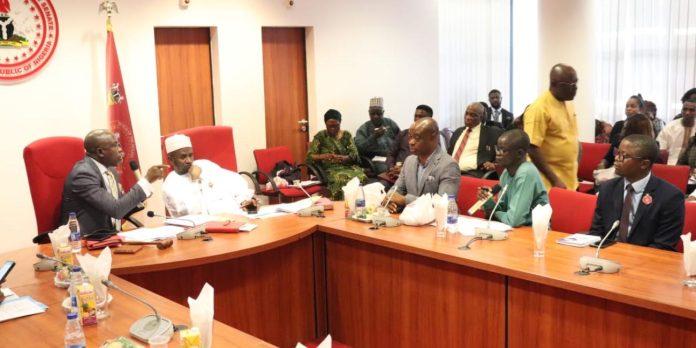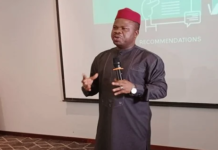
Media groups and civil societies have called for the amendment Cybercrime Act Prohibition and Prevention Act 2015 following the continued abuse of its application by the Nigerian police and corrupt politicians.
The stakeholders made the call on Wednesday at the Senate building of the National Assembly following a public hearing on a Bill to amend Cybercrime Act Prohibition and Prevention Act 2015 organised by the joint Senate Committee on ICT and Cybersecurity.
The law was enacted in 2015 based on the understanding that threats to information and communication technology are a danger to Nigeria’s national security, affecting the country’s “economic, political, and social fabric.
The law which is long overdue for review and amendments particularly Section 24 in the Cybercrime Act undermines the freedom of expression and press freedom thereby denying the press its constitutional role of holding the government accountable.
The Nigeria Union of Journalists (NUJ) FCT Correspondents Chapel represented by the Chairman, Jide Oyekunle, while making a presentation at the public hearing urged the committee to expunge section 24 just as it described the law as obnoxious and vexatious considering its negative impact on press freedom.
The NUJ Chairman said the provision of Section 24 is inconsistent with the provisions of section 39 of the 1999 constitution as amended which grants freedom of expression adding that the law is inimical to the democratic rights of the citizens.
Oyekunle said, “The Nigeria Union of Journalists is using the opportunity of this public hearing to make input in the amendments of the Cybercrime Act Prohibition and Prevention Act 2015 which is long overdue for review and amendments considering the present global technology reality.
“It is however unfortunate that the political class deliberately manipulated the provisions of the law to police journalists, criminalize journalism, thereby suppressing freedom of expression and thoughts. This they do in abandonment of the primary objectives the act is set to achieve.
“Authorities in government have attempted to silence opposition views in the online media through arbitrary interpretation and abuse of the Cybercrimes Act particularly section 24 of the Act which addresses offensive and annoying statements on the internet otherwise known as cyberstalking, and several journalists, bloggers and individuals have been arrested in this regard.
“While some stories published through traditional media outlets (print and electronic) that were never sanctioned by the government have been attacked by the same government upon being rebroadcast or republished through online platforms.
“The government considers these repost offensive and libelous because of the rising influence of online platforms in Nigeria as major sources of information dissemination.
“For example; on December 8, 2022, authorities in the southern Nigerian state of Cross River filed cybercrime charges against the publisher of the privately owned news website CrossRiverWatch, Agba jalingo.
“He was charged with two counts of Section 24 (1)b of Nigeria’s Cybercrimes Act over the publication of a report on his platform in June 2022 on Elizabeth Alami Frank Ayade, the sister-in-law of Governor Ben Ayade.
“Similarly, Aiyelabegan Abdulrazaq and Oluwatoyin Bolakale publishers of the Independent News Website, Just Event Online and The Satcom Media respectively were also arrested on September 11 2023 and subsequently charged with cyberstalking over their reports about a local politician.
“The offence is punishable by up to three years in jail and a 7 million naira (US$9,024) fine—and conspiracy—which carries a penalty of up to seven years in jail—under the Cybercrimes Act, though the charges were later dropped.
“The government and other powerful entities have hidden behind the accusation of cyberstalking to harass and press charges against online and traditional journalists for expressing views that are considered unfavourable to the government.
“Distinguished Senators and stakeholders we should make history today and apply the law properly to suit the sensibility for which it was enacted for while the media houses, firms and practitioners would operate by the superintending ethics of the media profession.
“The constitution remains the ground norm and by virtue of section 1(1) and (3) of the Constitution, the Constitution is supreme and takes precedence over any other law. Any other law which is inconsistent with the provisions of the Constitution shall to the extent of the inconsistency be void.
“Furthermore the ECOWAS court in a ruling in a case brought by SERAP in March 2023 ruled that Section 24 of the Cybercrime Act is contrary to the rule of law; therefore, the Nigeria Police cannot charge anyone with cyberstalking based on the provision of Section 24.
“The Court declared Section 24 of Nigeria’s Cybercrime Act vague, arbitrary and unlawful.
“The Nigeria Union of Journalists (NUJ) therefore recommends that the provision of Section 24 of the Cybercrime Act 2015 is cancerous and inimical to the press freedom, freedom of expression and rule of law and should be totally expunged from the act.”
The Centre for Journalism Innovation and Development, a think tank for media development also recommended the removal of Section 24 of the CyberCrimes Act.
It also called for a thorough review and revision of this section to align with international standards of press freedom and protect the rights of journalists to report responsibly without undue legal threats.
Earlier in his own remark the Chairman of the Committee, Senator Shuiab Afolabi Salisu explained the rationale and national significance of amending the Cybercrime (Prohibition and Prevention) Act (Amendment) Bill, 2023.
Kindly contact us @ Naijalivetv@gmail.com
Call or Whatsapp: 07035262029, 07016666694, 08129340000






